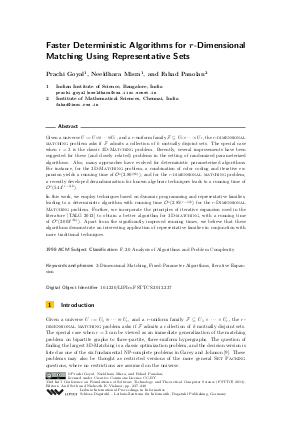Faster Deterministic Algorithms for r-Dimensional Matching Using Representative Sets
Authors Prachi Goyal, Neeldhara Misra, Fahad Panolan
-
Part of:
Volume:
IARCS Annual Conference on Foundations of Software Technology and Theoretical Computer Science (FSTTCS 2013)
Part of: Series: Leibniz International Proceedings in Informatics (LIPIcs)
Part of: Conference: IARCS Annual Conference on Foundations of Software Technology and Theoretical Computer Science (FSTTCS) - License:
 Creative Commons Attribution 3.0 Unported license
Creative Commons Attribution 3.0 Unported license
- Publication Date: 2013-12-10
File

PDF
LIPIcs.FSTTCS.2013.237.pdf
- Filesize: 0.51 MB
- 12 pages
Document Identifiers
Subject Classification
Keywords
- 3-Dimensional Matching
- Fixed-Parameter Algorithms
- Iterative Expansion
Metrics
- Access Statistics
-
Total Accesses (updated on a weekly basis)
0PDF Downloads0Metadata Views
Abstract
Given a universe U := U_1 + .... + U_r and a r-uniform family F
which is a subset of U_1 x .... x U_r, the r-dimensional matching
problem asks if F admits a collection of k mutually disjoint sets. The
special case when r=3 is the classic 3-Dimensional Matching problem.
Recently, several improvements have been suggested for these (and closely related) problems in the setting of randomized parameterized algorithms. Also, many approaches have evolved for deterministic parameterized algorithms. For instance, for the 3-Dimensional Matching problem, a combination of color coding and iterative expansion yields a running time of O^*(2.80^{(3k)}), and for the r-dimensional matching problem, a recently developed derandomization for known algebraic techniques leads to a running time of O^*(5.44^{(r-1)k}).
In this work, we employ techniques based on dynamic programming and
representative families, leading to a deterministic algorithm with running time O^*(2.85^{(r-1)k}) for the r-Dimensional Matching problem. Further, we incorporate the principles of iterative expansion used in the literature [TALG 2012] to obtain a better algorithm for 3D-matching, with a running time of O^*(2.003^{(3k)}). Apart from the significantly improved running times, we believe that these algorithms demonstrate an interesting application of representative families in conjunction with more traditional techniques.
Cite As Get BibTex
Prachi Goyal, Neeldhara Misra, and Fahad Panolan. Faster Deterministic Algorithms for r-Dimensional Matching Using Representative Sets. In IARCS Annual Conference on Foundations of Software Technology and Theoretical Computer Science (FSTTCS 2013). Leibniz International Proceedings in Informatics (LIPIcs), Volume 24, pp. 237-248, Schloss Dagstuhl – Leibniz-Zentrum für Informatik (2013)
https://doi.org/10.4230/LIPIcs.FSTTCS.2013.237
BibTex
@InProceedings{goyal_et_al:LIPIcs.FSTTCS.2013.237,
author = {Goyal, Prachi and Misra, Neeldhara and Panolan, Fahad},
title = {{Faster Deterministic Algorithms for r-Dimensional Matching Using Representative Sets}},
booktitle = {IARCS Annual Conference on Foundations of Software Technology and Theoretical Computer Science (FSTTCS 2013)},
pages = {237--248},
series = {Leibniz International Proceedings in Informatics (LIPIcs)},
ISBN = {978-3-939897-64-4},
ISSN = {1868-8969},
year = {2013},
volume = {24},
editor = {Seth, Anil and Vishnoi, Nisheeth K.},
publisher = {Schloss Dagstuhl -- Leibniz-Zentrum f{\"u}r Informatik},
address = {Dagstuhl, Germany},
URL = {https://drops.dagstuhl.de/entities/document/10.4230/LIPIcs.FSTTCS.2013.237},
URN = {urn:nbn:de:0030-drops-43761},
doi = {10.4230/LIPIcs.FSTTCS.2013.237},
annote = {Keywords: 3-Dimensional Matching, Fixed-Parameter Algorithms, Iterative Expansion}
}
